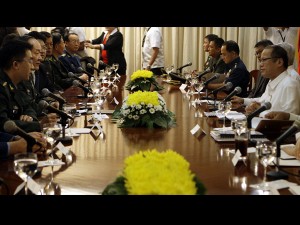
President Aquino talks with the delegation of Chinese Defense Minister Liang Guanglie, 2nd from left, during their meeting at the Malacañang Palace Monday. AP
MANILA, Philippines —The Philippines will file a new protest at the United Nations accusing China of territorial incursion, President Benigno Aquino said in an escalation of spats over disputed South China Sea islands.
China’s Embassy in Manila earlier denied the Philippine government’s allegations its ships intruded into the Spratly Islands close to the Philippine coast to build new structures and fortify its claim in the potentially oil-rich region.
Aquino, speaking to Filipino reporters during a visit to Brunei, said that the Philippines is planning to file a protest at the UN for a series of incursions.
“There are six or seven (incursions) happening after February 25. We are completing all the necessary data and then we will present it to them (China) and then file it with the appropriate body, which is the UN,” he said.
Aquino said he is still hoping to visit Beijing later this year, and will engage China, a key trade partner, in talks during upcoming regional summits.
The disputed Spratlys, which are believed to be atop vast oil and gas reserves, have long been feared as a potential flash point of armed conflicts in Asia. The chain of largely uninhabited islands, reefs and banks which are claimed by China, the Philippines, Brunei, Malaysia, Taiwan and Vietnam, straddle some of the world’s busiest commercial sea lanes.
The Philippine military has reported that a Chinese surveillance vessel and navy ships were seen unloading building materials and erecting posts in the vicinity of Iroquois Reef and Amy Douglas Bank — an uninhabited undersea hill claimed by the Philippines about 230 kilometers from southwestern Palawan province.
It is part of the Spratlys but well within the Philippines’ 200-mile exclusive economic zone, the Department of Foreign Affairs said.
The Chinese Embassy in Manila said in a brief statement that “the reported ‘incursion of Chinese ships’ is not true.” But, it acknowledged the presence there of a Chinese marine research ship “conducting normal maritime research activities in the South China Sea.”
Foreign Affairs Secretary Alberto del Rosario said any new construction by China in the area “is a clear violation” of a 2002 accord that China signed with the Association of Southeast Asian Nations, which includes the Philippines. It calls for countries to exercise restraint and stop occupying new areas in the disputed waters.
Two DFA officials told reporters Thursday that local authorities have monitored about six aggressive acts of China in the Spratlys that have raised worries that Beijing may be embarking to fortify its territorial claims by constructing new structures on barren offshore areas.
Those acts included the reported firing last February by a suspected Chinese naval vessel to scare away Filipino fishermen from the Jackson Atoll in a Spratlys area claimed by Manila, said the officials, who spoke anonymously because of the sensitivity of the subject.
In March, the Philippines accused two Chinese patrol boats of harassing a Philippine oil exploration ship near Palawan. Last month, the Philippine Air Force reported that two unidentified foreign fighter jets had flown near a Spratly island occupied by Filipino troops but China denied sending the aircraft.
Chinese media have reported that Beijing plans to install an advanced oil rig in the South China Sea in July. The Philippines expressed concern and asked China’s embassy last week about the exact location of the planned oil rig and said that it should not be placed in Philippine waters.
In April, China countered a previous Philippine diplomatic protest at the United Nations by saying it has indisputable sovereignty over the Spratly islands that Manila “started to invade” in the 1970s.
China’s claim to the islands and nearby geographic features was detailed in a map submitted to the UN in 2009.
Vietnam and Malaysia have also filed protests to the United Nations against China’s map. The protests are registered with the UN Commission on the Limits of the Continental Shelf, which will not rule on a claim if it involves disputed territory unless there is prior consent given by all states involved in the dispute.